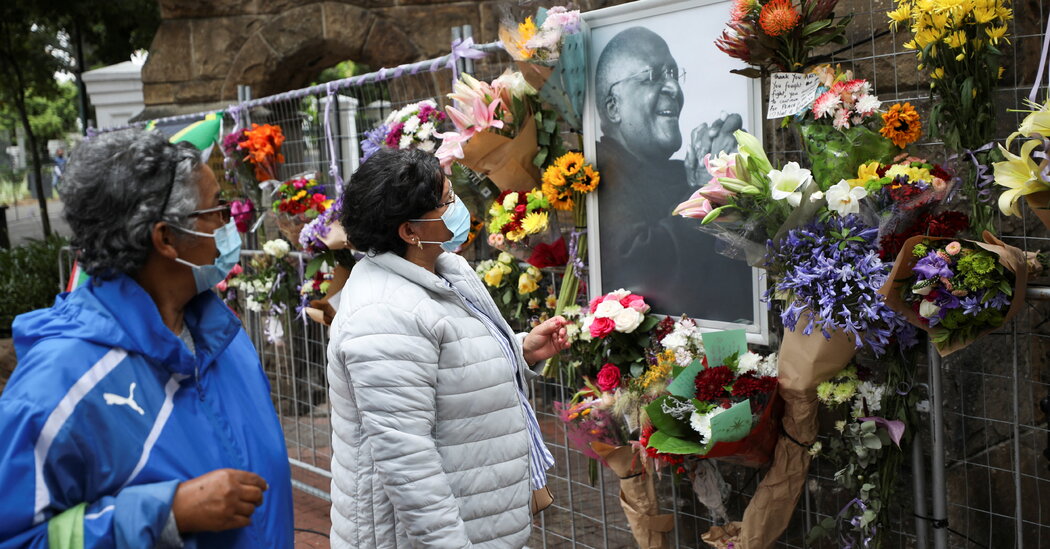
CAPE TOWN — The bells of St. George’s Cathedral in Cape Town rang out on Monday as South Africans began a week of mourning for Desmond M. Tutu, the first Black archbishop of Cape Town, who died on Sunday at 90.
The cleric was one of the most powerful voices in the anti-apartheid movement, and remained a voice of moral conscience in the decades after the system of institutionalized segregation crumbled in South Africa. His death was met with an outpouring of tributes in South Africa and from around the world.
Undeterred by gray weather and a cold drizzle, mourners placed flowers along the walls of the church. Several recalled personal encounters as they signed a book of remembrance for the archbishop, a testament to how accessible he was to the South African public despite his global stature.
“He met my son who’s blind and took to him nearly 20 years ago,” said Maeve King, tearing up. She said it “was extraordinarily special” that the archbishop had been kind and treated her son “like he was just like everyone else. Besides what he did for this country, besides his integrity, besides his honor, besides the magnificent man that he was.”
Peter McPherson, 67, was among a crowd of thousands in Namibia when he first met the archbishop, soon after that country’s independence in 1990.
“As an Anglican, he was our leader, but also a leader to everybody in South Africa,” he said.
Bishop Malusi Mpumlwana, now the general secretary of the South African Council of Churches, recalled the archbishop’s generosity and grace when he held the same position during apartheid.
“Archbishop Desmond was given to superlatives,” Mr. Mpumlwana said. “But he also gave superlatively, he also loved superlatively. He admonished superlatively. Nothing was in half measures in Archbishop Desmond.”
The bells of Archbishop Tutu’s former church will toll for 10 minutes at noon every day this week, until his funeral mass on Jan. 1, at the same cathedral. The service will be limited to 100 people because of the pandemic.
The archbishop’s remains will be cremated, and his ashes interred at St. George’s Cathedral, church leaders said. As the first Black archbishop of Cape Town from 1986 to 1996, and leader of the Anglican Church in South Africa, Archbishop Tutu celebrated Mass at the same cathedral.
Until his funeral, flags across the country will fly at half-staff, South Africa’s president said. Table Mountain, a Cape Town landmark, will be lit up in purple, reminiscent of the purple robe Archbishop Tutu wore as leader of the Anglican Church in South Africa.
In accordance with Archbishop Tutu’s wishes, the church will take the lead in planning events surrounding his funeral. Throughout the week, several churches across South Africa and in neighboring countries will host memorial services, both Christian and interfaith, in his honor.
The Nobel laureate will lie in state at St. George’s Cathedral on Friday, where members of the public will be allowed to pay their respects.
Archbishop Tutu’s funeral will not be exempt from Covid-19 regulations currently enforced in South Africa. The public viewing will be regulated by social distancing rules, in addition to the limited attendance at the funeral mass, where family members and clerics will take precedence on the small guest list, church leadership said during a news briefing on Monday.
Coronavirus cases rose exponentially in the country after the detection of the Omicron variant in southern Africa in November. Fortunately, the rates of hospitalizations and death from Covid-19 have not kept pace and cases seem to have peaked in the epicenter of the outbreak, Gauteng Province.
“Please don’t get into a bus to Cape Town,” said Thabo Makgoba, the current archbishop. “We will have to be pastoral and firm and encourage people to watch from home.”
The man fondly known to South Africans as “the Arch” succumbed to cancer at a care facility in Cape Town. He was first diagnosed with prostate cancer in 1997 and was hospitalized several times in the years since, amid recurring fears that the disease had spread.
In what would be his last eucharist on Christmas Day, Archbishop Tutu was frail but filled with gratitude, said Archbishop Makgoba, who carried out the service.
“Tata has been very frail and in pain for many, many months,” said Dr. Mamphela Ramphele, a former anti-apartheid activist who spoke on behalf of the family. She added that the “overwhelming feeling is relief that he has gone to his Maker and his ancestors, and they love him too much to have wanted to continue to see him suffer.”
The Tutu family and close friends will hold a private service on Thursday evening. At the Tutus’ home in Cape Town on Monday, dignitaries, clerics and friends arrived to pay their respects to his widow, Nomalizo Leah, and their children and grandchildren.
Among them was President Cyril Ramaphosa of South Africa, who hailed Archbishop Tutu’s courage in speaking out against the apartheid government, as well as the democratically elected African National Congress, whose legacy as a party of liberation has been tarnished by corruption, poor governance and internal squabbling.
“As he became concerned about some of the errors of the governing party, he spoke out, he was brave, he was forthright. And we loved him just for that,” Mr. Ramaphosa said.
Zanele Mji reported from Cape Town; Lynsey Chutel from Utrecht, South Africa.




